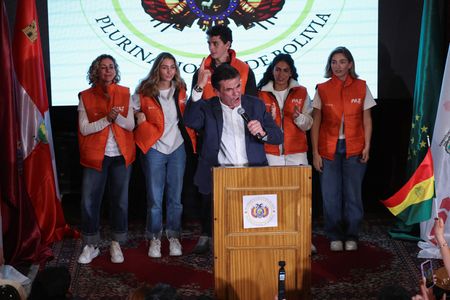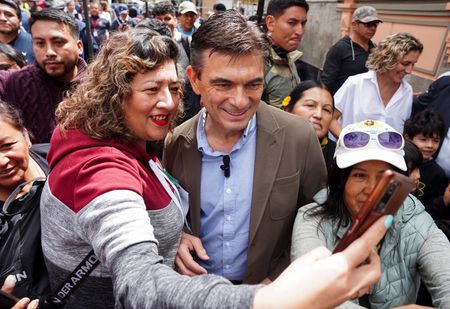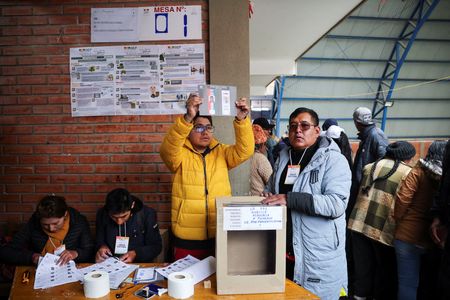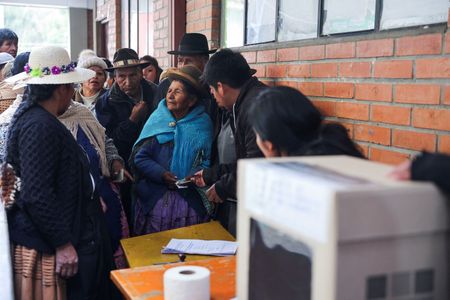By Lucinda Elliott and Monica Machicao
LA PAZ (Reuters) -Centrist Rodrigo Paz won Bolivia's presidential runoff on Sunday, defeating conservative rival Jorge "Tuto" Quiroga, as the country's worst economic crisis in a generation helped propel the end of nearly two decades of leftist rule.
Paz, a senator from the Christian Democratic Party, won 54.5% of the vote, beating Quiroga's 45.5%, according to early results from Bolivia's electoral tribunal. But Paz's party does not hold a majority in the country's legislature, which will force him to forge alliances to govern effectively.
The new president takes office on November 8.
"We must open Bolivia to the world," said Paz during his victory speech from La Paz, after Quiroga conceded defeat.
The 58-year-old senator's win marks a historic shift for the South American country, governed almost continuously since 2006 by Bolivia's Movement to Socialism, or MAS, which once enjoyed overwhelming support from the country's Indigenous majority.
Paz's moderate platform — pledging to maintain social programs while promoting private sector-led growth — appeared to resonate with left-leaning voters disillusioned by the ruling MAS, founded by former President Evo Morales, but wary of Quiroga's proposed austerity measures. He is the third member of his extended family to be elected president of the landlocked nation.
Support for MAS cratered in the August first round amid a deepening economic crisis.
"This election marks a political turning point," said Glaeldys Gonzalez Calanche, analyst for the Southern Andes at International Crisis Group. "Bolivia is heading in a new direction," she said.
Both runoff candidates pledged to strengthen diplomatic ties with Washington — strained since 2009 — and seek U.S.-backed financial support to stabilize Bolivia's fragile economy.
In late September, Paz unveiled plans for a $1.5 billion economic cooperation deal with U.S. officials to ensure fuel supplies.
U.S. Secretary of State Marco Rubio said this week that both presidential candidates "want stronger, better relations with the United States," after decades of anti-American leadership. "This election is a transformative opportunity," he said on October 15.
Outside a polling station in La Paz, Lourdes Mendoza said she had grown weary of the MAS era. "My children were born and raised with a single government," she said. "I hope they can see other possibilities and alternatives."
VOTERS WANT ECONOMIC CHANGE
Bolivia's fragile economy dominated the runoff campaign. Once plentiful natural gas exports have plummeted, inflation is at a 40-year high, and fuel is scarce.
Both candidates campaigned to roll back elements of the MAS era, state-led model, but differed over how drastically. Paz favored gradual reform, including tax incentives for small businesses and regional fiscal autonomy, while Quiroga proposed sweeping cuts and an IMF bailout.
"We're going for a new stage of Bolivian democracy in the 21st century," Paz told Reuters two days before the election at his family's ranch in the southern gas-producing region of Tarija.
"We're going to try to build an economy for the people," he said, one where "the state is no longer going to be the central axis."
Some voters said they were not convinced that his victory represented a true break from MAS: "I think he's a puppet of the outgoing government," said 21-year-old Esther Miranda from La Paz, who works in a nail salon.
RUNNING MATE'S POPULIST APPEAL BOOSTS PAZ
Paz's campaign was boosted by his running mate Edman Lara, a former police officer known for viral TikTok videos exposing corruption. Lara's populist appeal helped Paz connect with younger and working-class voters, analysts said.
Economists warn the incoming administration faces immediate challenges, including securing fuel supplies and building coalitions in a fragmented legislature.
Outgoing hydrocarbons minister Alejandro Gallardo said last week that the state energy company was struggling to obtain foreign currency for fuel imports.
Paz told Reuters he was already addressing the issue through deferred payment agreements with fuel suppliers to ensure diesel and gasoline arrive within days of his inauguration.
Paz said he would also begin phasing out universal fuel subsidies. Targeted support would go to vulnerable groups, while bigger industries such as agribusiness would pay market rates for fuel.
"The market will have to adjust prices, but there are sectors that will have government support until the economy is reactivated," he said.
Bolivia's main labor union, the Central Obrera Boliviana (COB), has previously warned it would oppose any threats to the social and economic gains achieved so far, in a sign of the juggling act for Paz's government to avoid street protests.
Paz's PDC won 49 of 130 seats in the lower house and 16 of 36 in the Senate, just ahead of Quiroga's coalition, which secured 43 seats in the lower house and 12 in the Senate.
(Reporting by Lucinda Elliott in Montevideo, Monica Machicao and Daniel Ramos in La Paz; Additional reporting by Brendan O'Boyle in Mexico City, Diego Delgado in La Paz, Rodrigo Gutierrez and Reuters TV in Tarija, Bolivia; Editing by Rosalba O'Brien, Nia Williams, Deepa Babington and Thomas Derpinghaus.)











